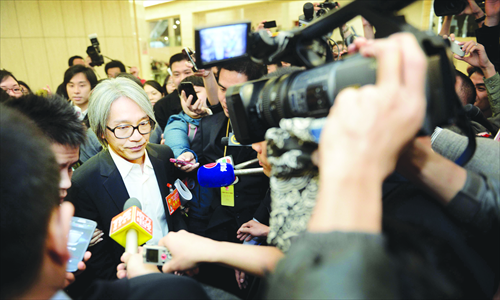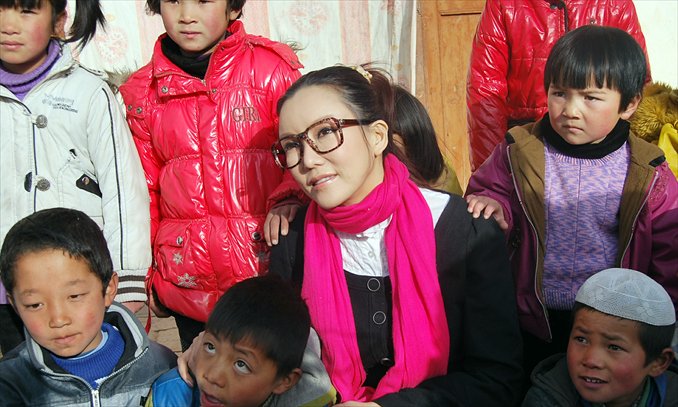Political all-stars

While some government officials are brewing up a storm online for their leaked sex tapes, one soft core porn actress has made her own splash by debuting as a political adviser.
On January 22, wearing a pair of black glasses and a ponytail, Peng Dan, also known as Diana Peng, a Hong Kong actress who used to star in erotic movies, attended the opening ceremony of the 11th Gansu Provincial Committee of the Chinese People's Political Consultative Conference (CPPCC) in Lanzhou, capital city of Northwest China's Gansu Province.
The news soon invaded social networks, with some questioning how Peng was selected for the post and others ridiculing her wholesale transformation.
At a time when old politicians are ending their five-year term, many new well-known faces, including a roster of entertainment stars, have been listed on national and regional CPPCC committees.
Some fans showed support toward these fledgling politicians but far more said they were convinced of their acting skills but not of their ability to play politicians.
Experts also only openly expressed worry that the CPPCC committees would soon degenerate into a farce used by both local authorities and participants to boost their reputation from a body originally intended to provide political consultations and exercise democratic supervision over the government.
Walk of fame
Peng, 40, born in Changsha, Central China's Hunan Province, originally rose to fame for her hourglass figure and her starring role in Hong Kong skin flicks such as 1997's Erotic Ghost Story: Perfect Match.
In recent years, she has sought to focus her career in the mainland and starred in more mainstream films such as the patriotic Lovely China in 2009.
However, her move into politics this year took many aback. Some sought to explain the political consultation as being more inclusive, while others expressed full-blown sarcasm.
"I think the significance of Peng being selected is that the male members will not fall asleep but will keep their eyes on where she sits," Kong Zhiyong, a sales manager, commented on his Sina Weibo. "Thus, more porn stars will be admitted to the committees."
Peng is not alone in facing this controversy. Stephen Chow, a Hong Kong comedian and film director, also made waves after being selected as a member of the 11th CPPCC Guangdong Provincial Committee.
Unlike Peng, who has been present through the whole seven-day meeting in Gansu, Chow, without handing in any proposals, only showed up for around 80 minutes at the meeting hall on the morning of January 25 after the six-day session opened in Guangzhou on January 23.
During that time, Chow was busy promoting his latest movie Journey to the West: Conquering the Demons, which will be released on February 10.
"This is the reality. You can't expect too much of these newcomers. But the attitude is important. It's not right for Chow to have been absent for nearly all the meetings. That's why some even called for him to be removed from the body," Han Zhipeng, a member of the Guangzhou CPPCC committee and also editor-in-chief of Guangzhou Overseas Chinese Business Post, told the Global Times.
In the face of mounting suspicions over the legitimacy of their entry into the advisory bodies, both the local authorities in charge responded that selection procedures had been within the rules.
According to the CPPCC Guangdong committee, Chow is among 93 specially invited figures from Hong Kong. Su Zhengwu, an official with the committee, said Chow was qualified and presented unique advantages.
"As a public figure, he has social influence. He is also a representative of his professional circle. As a Hong Konger, it also helps to boost cooperation between Hong Kong and the mainland," he told the Xinhua News Agency.
The United Front Work Department of the Gansu CPC Committee explained that Peng was recommended by the China Zhi Gong Party and approved by the provincial CPPCC standing committee before becoming one of the 19 members from literature and art circles.
Poor selection process
The widespread questions about these celebrity-cum-political advisers speak volumes about the public discontent with the CPPCC's current selection mechanism, Qiao Xinsheng, professor from Zhongnan University of Economics and Law, told the Global Times.
Chow's secretary Winnie attributed Chow's absence to "being noticed too late." According to Winnie, they were asked to join the assembly on January 17, six days before the meeting's opening when all of Chow's agenda for January and February had already been fixed.
The local authority declined to confirm this. But there were cases where some people were selected without prior notification.
In March 2010, several CPPCC National Committee members, including Ding Weiyue, an academician from the Chinese Academy of Sciences, and Lawrence J. Lau, then President of the Chinese University of Hong Kong, revealed that they knew of their selection only through media reports when the name list was issued.
"Nobody ever asked for my opinion," Ding told the press. However, the national committee explained to Ding that it was an isolated case resulting from negligence.
According to official procedures, the official making the recommendation must first acquire the consent of the person they plan to recommend.
Nevertheless, Qiao suggested that more transparency and stricter standards are needed.
"Absorbing film stars without any political experience into such a serious organization would not only damage its authority but also make it a laughing stock for other countries," Qiao said.
Han agreed with Qiao, saying that some celebrities would simply muddle through their duties, putting forward truly poor proposals.
For example, actress Gong Li's proposal "Environmental protection starts from me" to the CPPCC National Committee in 2007 was criticized by Web users for seeming like a school project.
Chinese star hurdler Liu Xiang admitted in 2010 that his proposal to establish a security mechanism for sports coaches was written by someone else.
"It is now becoming a trend for CPPCC committees to introduce celebrities to expand their influence. But it's putting the cart before the horse if too much attention is paid to this entertaining effect while neglecting their true function," Qiao warned.
According to the name list of the 12th CPPCC National Committee released recently, among its 2,237 members, the representatives from literature, art and sports circles total 166, not including celebrities from other groups, higher than the 151 members from economic circles and 67 with an agricultural background.
There is some ground for the public to be skeptical about celebrities' purpose in seeking to enter politics and whether they understand the role of a political adviser.
China's Got Talent 2011 winner Zhuo Jun, a break dancer, 21, became the youngest member of the Guangxi Zhuang Regional CPPCC Committee this year. But he told the media that he had no idea what the CPPCC did when he applied for membership.
"It seemed that these celebrities have helped to increase the influence of the political consultation system, but these disqualified members in essence are turning the system into a waste," Qiao lamented.
It's true that these celebrities have largely boosted media coverage of the CPPCC meetings.

Getting to work
Peng tabled two proposals in Gansu that she said she worked on for over two months, advising the local government to make a historical and revolutionary theme film featuring the Fourth Front of the Red Army, and to build a film base in the province.
However, her past seemed more appealing than her proposals.
"Frankly speaking, the locals care more about the pricing of daily necessities like noodles than what the advisers say," Sui Xin, an online journalist in Lanzhou, told the Global Times. "And Web users are definitely focusing more on her past career."
Peng told media the public failed to view her in the right light but pledged she would try her best to be a qualified adviser.
After the meeting, she also toured rural areas of Gansu to learn about grass-roots conditions.
In what seemed to constitute well-tailored photo opportunities, she toured the county of Longxi to learn more about the production and sales of medicinal herbs.
In a poverty-stricken town in Dongxiang county, she had a simple dinner with township officials and visited a poor primary school, bringing gifts like school bags and exercise books to the children.
In an video interview with the China News Service on February 5, Peng stressed that she had never thought about seeking political office to further her career.
"As a political adviser, I know I should do things for the people, represent them and reflect their will. But it has no essential connection with my profession in film," she said.
"Compared with some other members, Peng has done a better job," Han commented, "I hope the CPPCC members can fulfill their duties to the best of their ability, which is the best way for the body to gain more recognition," Han said.
Several celebrity turned political advisers, including popular China Central Television talk show host Cui Yongyuan, refused to comment for this story.
Qiao suggested that in future, authorities outline the specific requirements and conditions allowing candidates to be selected, while Han called for an elimination mechanism to be created.
"Unqualified members should be dismissed from the assembly," Han said, noting that the Guangzhou CPPCC Committee is trying out an evaluation system that will see members with poor performances pushed to quit.